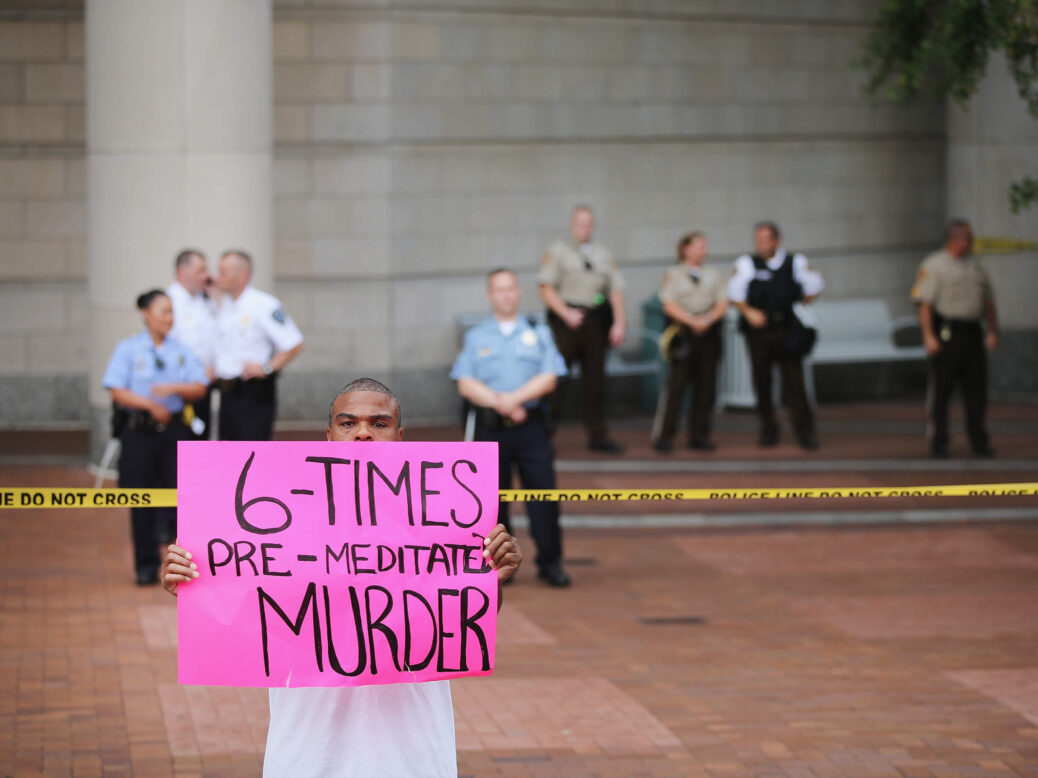
“Please repeat, this is America,” I hear Elon James White say. Right now, I’m listening to live radio despatches from reporters choking through tear gas in Ferguson, Missouri. Their voices are muffled by gas masks and there is screaming in the background. For days, there has been a running battle between law enforcement and local protesters after a policeman shot a black teenager called Michael Brown.
At many of the protests, only one side had weapons. Peaceful demonstrations, with people holding up their hands – just as Brown is said to have done – have been met with tear gas and pepper spray. Journalists have been attacked and arrested. Amnesty International has sent observers.
I am struggling to hear the radio report over the industrial roar of an espresso machine and the smooth jazz drifting in through speakers. I am sitting in a hipster café in Cambridge, Massachusetts. The girl at the next table over from me has no idea where Ferguson is, or what is happening there, despite the battle for her country’s soul going on 1,200 miles away in the Midwest. She was unaware, until I brought it up in conversation, that on 9 August, an unarmed African-American teenager had been shot and killed by police. Outside, on a balmy, late-summer morning in a mainly white university town, with no police on the streets, life goes on as normal. Please repeat – this is America.
In Britain, we’ve seen this already. Almost exactly three years before the Ferguson protests broke out, the Metropolitan Police shot and killed an unarmed man, Mark Duggan, in Tottenham, north London. Peaceful demonstrations turned into several days of pandemonium as young people came out to loot shops and fight the police. Thousands of arrests were made and the government was hours away from sending in the army.
The protests in Ferguson are different in many ways from the 2011 English riots but there are also disturbing similarities: in August 2011, the official story was that the civil disorder had nothing to do with “real” politics, nothing to do with racist policing and repression. It was – in the words of the Home Secretary – “pure criminality”. It had nothing to do with class, or austerity, or the racial prejudice baked into both of those axes of oppression. Law enforcement was justified in making mass arrests and using extreme force to bring the situation under control – the only response to civil breakdown, then as now, was to bring in the big guns. And, as with the situation in Ferguson, everything hung on the character of the deceased.
In a fast-moving media situation, with people scared and looking for answers, the tide of public anger can sometimes be turned back if only it can be proved that the victim was armed – or, if he wasn’t armed, then that he looked armed. Or if he didn’t look armed, if he was just a terrified kid with his hands in the air, then he was a criminal thug who deserved to die.
In the weeks after the Tottenham riot, Mark Duggan’s reputation was summarily executed in the British press. Photos of the 29-year-old father with his face set in a thuggish snarl were plastered everywhere. It later emerged that this image had been cropped from a photo of Duggan standing by the grave of his baby daughter. The expression on his face was grief.
This month, Missouri police similarly attempted to retain control of the narrative. First, they claimed that Brown had attacked the officer who shot him. Autopsy reports showing that Brown was shot six times in the front went viral online. The story changed: Brown was portrayed as a bad kid who may have stolen cigars from a shop. Then footage emerged apparently showing him paying for the cigars. By this point, the world was watching the lies fall apart from one moment to the next.
What is happening in Ferguson is about more than Brown and his family. It’s a shadow play of a national crisis in race relations and class repression, as white police officers in battle gear place a largely African-American town under military occupation, using sound weapons and rubber bullets, suffocating the streets with tear gas. Its citizens crouch in lines with their hands up, wearing T-shirts emblazoned “Stop killing us”.
This isn’t just about Ferguson. It isn’t even just about America. It’s about the story of America, the story of capitalism as fair, stable and triumphant, and whether this can be sustained in a world whose certainties are lying in shards at the feet of the rich. The old story of a just superpower no longer holds. If there is no justice in Ferguson, how can there be justice in Fallujah? In Shejaiya?
For white Americans in sleepy university towns, life goes on as normal. The streets are clean and there are still bagels for breakfast. For everyone else, the jig is up. Social media is making all sorts of convenient fictions impossible to sustain. It remains to be seen if the idea of America as a just and mighty world policeman can survive the internet age – and what the consequences will be if it can’t.
Postscript
This will be my last column for the New Statesman, for now. I’ve been awarded a journalism fellowship by the Nieman Foundation at Harvard University, which prohibits me from doing regular writing elsewhere. It’s a unique opportunity for me to deepen my reading and become better at the work I love but I’ll miss the NS very much – it has been a privilege to work with this editorial team and to correspond with such an engaged and interesting cohort of readers.
I’ll return in June 2015. In the meantime, I absolutely promise not to pick up any bizarre American spelling conventions, as long as you all promise not to let the Tories back in. I hope we have a deal.



